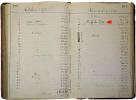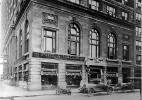|
HISTORIC
Oak Hall
...and the Memphis Halle Family |
|
|
 |
Many of
the historic businesses in Memphis have changed hands or have come
and gone throughout the years. One giant is left standing, and
it remains in the hands of the original family after almost a
century and a half: OAK HALL.
Their
long history is based on personalized and dignified service:
Offer customers the greatest selection, give them the greatest
service and exceed their expectations every time they visit.
|
|
|
|
|
|
|
|
|
|
|
|
Click on small photo to
enlarge the photo |
|
|
|
|
|
|
|
|
Three
Halle brothers arrived in Memphis in the early 1850s. They had
left their home in Altona, a suburb of Hamburg, Germany where their
family had lived since the 1680s. Rough times were ahead for
Memphis during this period - the Civil War as well as the
devastating effects of all the Yellow Fever epidemics.
Many of these early immigrants would perish or leave Memphis, never to return.
But the Halle family
remained and continued to establish businesses. With their
success, they
became identified with the carriage trade of Memphis and the
entire Mid-South. |
 |
| |
1800s
Hamburg, Germany |
|
|
|
 |
Solomon
Halle - the youngest of the brothers, opened OAK HALL in downtown
Memphis in 1859, during the presidency of James Buchanan.
It was one of the first ready-to-wear menswear stores in the
country. And it's still owned and operated by direct
descendants of Solomon and is now one of the oldest family-owned
businesses in the United States. Solomon is credited
with establishing an Oak Hall tradition: "Always look for
something new and don't be afraid of change." |
| Solomon Halle |
|
|
|
|
|
|
|
|
|
|
|
|
|
|
|
In the
1800s, clothing stores didn't actually have set prices.
People of different social backgrounds would pay entirely
different rates. Oak Halls policy was that everyone pays
the same price, regardless of the current balance in their bank
account. They were designated as the "One Price Clothing House"
and that statement is "in writing" at the top of their
billhead. And the store was always known for "impeccable
customer service" |
 |
| |
1882 "One Price Clothing House" |
|
|
|
|
|
|
|
 |
In
1876, Solomon Halle built a 3 storey, seventeen room home for
his family. For many years It was a landmark in the 300 block of Poplar,
near Main. Sadly, the home was demolished in the 1960s. |
| |
|
|
|
|
 |
William "Buffalo Bill" Cody shopped at Oak Hall, and you can
still see his signature in the 1900 Oak Hall registry. He
came to the store at least 3 times at the turn of the century. |
 |
| Buffalo Bill |
|
1900 Oak
Hall Register |
|
|
|
|
Solomon really cared about his clothing store and to make sure
the stock was the best, he made frequent trips to New York to
visit the designers and manufacturers. Oak Hall remained
in downtown Memphis at the same location for a record 111 years.
(251 Main Street , which became 55 N. Main when the numbering
system changed in 1905). They did expand into the building
next door, which more than doubled the size.
Solomon died unexpectedly in 1890 while on a buying trip
to New York with two of his sons. After his death, the
Memphis Directories show "Henry & Bro" as being in charge.
|
|
| |
|
|
|
|
The Memphis
Directories (below), beginning in 1859, show the Halle family as
they grow along with the growth of Memphis. Strangely, even though
the sign on the store was "OAK HALL" from the beginning, that name
was not used in the directories until 1892. The directory listing always
read Sol (somtimes Solomon) Halle, 155 Main Street. For a
couple of years after Solomon's death, the listing was for
"Henry Halle & Bro" (Henry and David). |
 |
 |
| |
1892 Oak
Hall |
1891 H. & Bro |
|
|
|
|
|
|
|
|
|
|
|
|
The downtown Oak Hall was located across from the Odd Fellows
Hall on Main Street. The Odd Fellows Hall, dating from
1851, was demolished in 1924 to build the Columbian Mutual
Tower. And the Oak Hall building was demolished around
1996 to build
the Sleep In and the more recent Marriott Courtyard. Of course the area has
changed since then: This section of Main Street is now
closed to traffic. And N. Court Avenue used to continue on
to Front Street. |
 |
| |
Location Map |
|
|
|
 |
 |
 |
 |
 |
|
Main 1920s |
1924 |
1924 UCV
Sponsor |
1930s Hat |
Trade Mark
1953 |
|
|
|
|
|
|
|
 |
After
111 years of success in downtown Memphis, Oak Hall moved to 555 Perkins
in 1970, and then in 1996, made the move further East to Regalia
- each time landing in what would soon be the center of the
commercial sector of Memphis. This forward thinking trend seems
to be apparent in other changes Oak Hall has made throughout the
years.
The
current guard at Oak Hall consists of Bill Levy and Bob Levy,
the great-great grandsons of the original proprietor, and Bill's
son Will Levy, the sixth generation in line to run the business. |
| 1966 Ad |
|
|
|
|
 |
 |
 |
 |
|
Oak Hall Opening |
555 Perkins |
Oak Hall Regalia Center |
Oak Hall Interior |
|
|
|
|
Oak Hall Run for St. Jude .
In
1977 Bill Levy, president of Oak Hall Inc. started the Oak Hall
Run for St. Jude. He didn't know it would turn into the biggest
road race in Tennessee and a favorite race for many Memphians.
Between 1977-2001, the race raised over 2 million for St. Jude. The
Oak Hall Run for St. Jude became a community wide event enjoyed
by serious athletes, weekend joggers, families, and anyone
wanting to support St. Jude Children’s Research Hospital.
|
| |
|
|
|
|
|
In 1979,
Oak Hall opened it's Ladies Department, with the opportunity to
grow from 25-35% of the total.
In 2008, the
Vineyard Vines Shop opened for "preppy clothing",
appealing to the youth. |
|
 |
 |
|
Ladies |
Vineyard
Vines |
|
|
|
|
|
|
|
|
|
 |
|
|
|
|
|
The Halle
Family .
Oak Hall
is the family business and at one time or another, it appears that
every Halle spent some time there, possibly "learning the
business". They've not all stayed in the business at Oak Hall, though.
As you will see below, some have worked in different areas, while
others have also been involved with clothing stores. At
various times some of the Halle's either worked for or were in
business with the Menken Bros and the Goldsmiths. |
|
|
|
|
 |
The
Phil A. Halle
Clothing Company prominently occupied the first three floors of
the Memphis Exchange Building for many years. It was run
almost as an "extenson" of Oak Hall - same type of
merchandise and customer service. |
| |
|
|
|
|
|
|
|
|
|
A.
Arthur Halle
was co-founder of the Memphis Cotton Carnival. He
and a group of businessmen called on theatre manager Herbert
Jennings, for a donation. Jennings shared an idea that he
believed would help promote business by displaying cotton goods
in his theatre. He also encouraged them to use their own store
windows to promote cotton clothing. Halle was intrigued by
the idea and envisioned a larger city-wide promotion. The
ideas quickly grew into a plan for a grand celebration with a
King, Queen and Royal Court that would involve people from all
over the Mid-South. The idea was to promote the use and wearing
of cotton which would lead to increased demand and stimulate
sales. It worked, and the rest is history. |
 |
| |
A. Arthur
Halle |
|
|
|
Jacob
Halle and the
Jacob Halle & Co at 339 Main ... and
an 1874 fire
that puts the store out of business...
...but
Louis
Halle
had a clothing store at 239 Main up to 1905. |
 |
 |
| |
1874 Fire |
1880 Louis |
|
|
|
|
Samuel
Halle
and
Henry Halle had a Cigar and Tobacco shop at 235 Main
. Henry also became a buyer for Oak Hall. |
 |
 |
| |
Cigar Store |
Buyer |
|
| |
|
Meyer
Halle
Dry Goods was at 122 Beale for years
- where the
Hard Rock Cafe is now. |
 |
| |
Meyer
Halle Dry Goods |
|
|
| |
|
|
|
Philip Halle, Jr. a seventh-generation Memphian was involved with
the development of more than 1800 lots primarily in the
Collierville area.
|
 |
| |
|
|
|
The
current guard consists of
Bill
Levy
and
Bob
Levy,
the great-great grandsons of the original proprietor, and Bill's
son Will Levy, the sixth generation in line to run the business.
They have recently expanded and opened an Oak Hall in Nashville
... |
| |
|
|
|
|
|
|
|
Oak Hall
MEMORABILIA
|
|
|
|
|
|
|
|
|
|
|
|
|
|
|
|
|
|
CREDITS |
|
|
The
Historic-Memphis website does not intentionally post copyrighted
photos and material without permission or credit. On
occasion a "non-credited" photo might possibly be posted because we
were unable to find a name to give credit. Because of the
nature of our non-commercial, non-profit, educational website, we
strongly believe that these photos would be considered "Fair Use.
We have certainly made no monetary gain, although those using this
website for historic or Genealogy research have certainly profited.
If by chance,
we have posted your copyrighted photo, please contact us, and we'll
remove it immediately, or we'll add your credit if that's your
choice. In the past, we have found that many photographers
volunteer to have their works included on these pages and we'll
also do that if you contact us with a photo that fits a particular
page. |
|
|
|
The "Historic-Memphis" website would like to acknowledge and thank the
following for their contributions which helped make this website
possible:
Memphis
Public Library, Memphis University Library, Memphis Law Library,
Memphis Commercial Appeal, Memphis Press Scimitar, Shelby County
Register of Deeds, Memphis City Schools, Memphis Business Men's
Club, Memphis Chamber of Commerce, Memphis City Park Commission,
Memphis Film Commission, Carnival Memphis, Memphis Historical
Railroad Page, Memphis Heritage Inc, Beale Street Historic District,
Cobblestone Historic District, Memphis Historic Districts, Vance
Lauderdale Family Archives, Tennessee State Archives, Library of
Congress, Kemmons Wilson Family, Richard S. Brashier, Lee Askew,
George Whitworth, Woody Savage and many individuals whose assistance is
acknowledged on the pages of their contributions. Special
thanks to Memphis Realtor, Joe Spake, for giving us carte blanche
access to his outstanding collection of contemporary Memphis photos.
We do not have high definition copies of the photos on these
pages. If anyone wishes to secure high definition photos,
you'll have to contact the photographer or the collector.
(To avoid any possibility of contributing to SPAM, we do not
maintain a file of email addresses for anyone who contacts us). |
|
|
|
|
|
|
|
|
|
|
|
|
| |
|
|